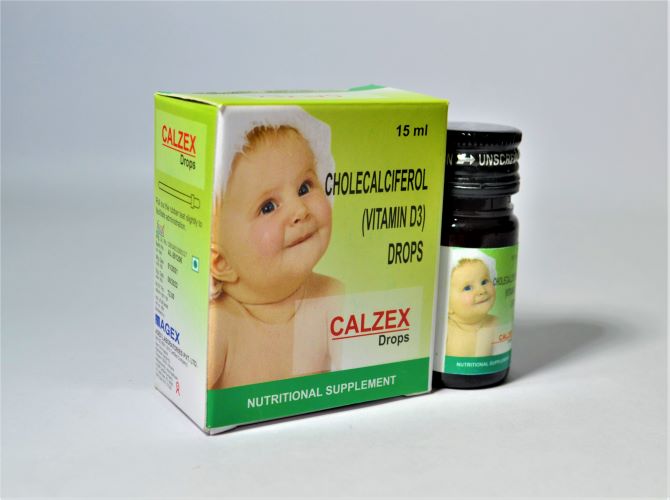
MRP : 72
Indications
Rickets and osteomalacia in children
Vitamin D deficiency in children
Contraindications
Hypersensitivity to the active substance, cholecalciferol (vitamin D3), or to any of the ingredients of Calzex Drops
Hypercalcaemia, hypercalciuria
Hypervitaminosis D
Kidney stones (nephrolithiasis, nephrocalcinosis) in patients with current chronic hypercalcaemia
Precautions & Warnings
Calzex (Vitamin D3) Drops should be used with caution in patients with impairment of renal function and the effect on calcium and phosphate levels should be monitored. The risk of soft tissue calcification should be taken into account.
Caution is required in patients receiving treatment for cardiovascular disease.
Calzex (Vitamin D3) Drops should be prescribed with caution in patients with sarcoidosis, due to a possible increase in the metabolism of vitamin D3 in its active form. In these patients the serum and urinary calcium levels should be monitored.
Allowances should be made for the total dose of vitamin D3 in cases associated with treatments already containing vitamin D3, foods enriched with vitamin D3, cases using milk enriched with vitamin D3, and the patient's level of sun exposure.
There is no clear evidence for causation between vitamin D3 supplementation and renal stones, but the risk is plausible, especially in the context of concomitant calcium supplementation. The need for additional calcium supplementation should be considered for individual patients. Calcium supplements should be given under close medical supervision.
Drug Interactions
Concomitant use of anticonvulsants (such as phenytoin) or barbiturates (and possibly other drugs that induce hepatic enzymes) may reduce the effect of vitamin D3 by metabolic inactivation.
Concomitant use of glucocorticoids can decrease the effect of vitamin D3.
In cases of treatment with drugs containing digitalis and other cardiac glycosides, the administration of vitamin D3 may increase the risk of digitalis toxicity (arrhythmia). Strict medical supervision is needed, together with serum calcium concentration and electrocardiographic monitoring if necessary.
Simultaneous treatment with ion exchange resin such as cholestyramine, colestipol hydrochloride, orlistat or laxative such as paraffin oil, may reduce the gastrointestinal absorption of vitamin D3.
The cytotoxic agent actinomycin and imidazole antifungal agents interfere with vitamin D3 activity by inhibiting the conversion of 25-hydroxyvitamin D3 to 1,25-dihydroxyvitamin D3 by the kidney enzyme, 25-hydroxyvitamin D-1-hydroxylase.
Dosage
As prescribed by the physician
Presentation
Calzex Paediatric Drops: 15 mL bottle with Dropper